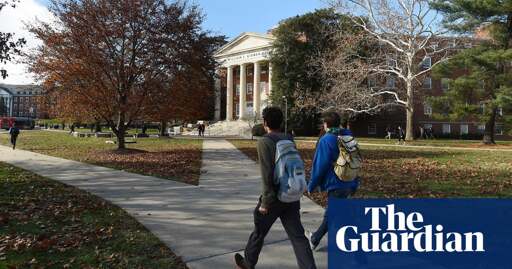Summary
College enrollment among 18-year-old freshmen fell 5% this fall, with declines most severe at public and private non-profit four-year colleges.
Experts attribute the drop to factors including declining birth rates, high tuition costs, FAFSA delays, and uncertainty over student loan relief after Supreme Court rulings against forgiveness plans.
Economic pressures, such as the need to work, also deter students.
Despite declining enrollment, applications have risen, particularly among low- and middle-income students, underscoring interest in higher education. Experts urge addressing affordability and accessibility to reverse this trend.



A thing that upset me when I went to college (15ys ago) was all the fluff electives I had to take. More than half of my classes were not associated with my major. I was looking into getting a masters a few years ago and one of the requirements was American History, again! I learned all of American history in elementary school, and all of it again in middle school, and all of it again in high school and again for my bachelors and I need to do it again for a Masters? Add along more sciences and math classes for an art related major. While I understand in building well rounded students, a lot of it seemed like it was meant to just beef up the number of classes I needed to pay for.
The number of electives needed was also enough where you only had two options.
What you’re describing sounds like a liberal arts school. That’s kind of the point, at least for undergrad.
Not OP, but no actually. My degree is an ABET accredited B.S. and I had to take about a years worth of classes (over the course of the four years) that had nothing to do with my degree (e.g. psychology, sociology, philosophy, etc.) Their “rational” was that it was to make students more well rounded human beings and members of society.
While I appreciate the sentiment in theory, I have to disagree with it in practice. For people like me that find those topics interesting already it seemed like a waist of time and money. While I did learn some new concepts it’s mostly stuff I had already learned in my free time or would have come across sooner than later. For most of the other people (who tend to be uncurious outside of their specific niche skill set or interests) most of the information and lessons end up being lost on them as it doesn’t really stick.
I’m sure they were some people it was beneficial for, but I doubt it was the majority.
Then again I’m not sure my view of the college experience was very typical. I was basically taking care of myself in some capacity by middle school and got a full time job during highschool in IT after my junior year via the trade program. I was living on my own and working full time while going to school full time. I’d go from work where the next youngest coworker was 10 years older than I was and people twice my age respected my opinion and person to classes where I was treated like an irresponsible child.
However, I would then over hear or observe other students taking about how surprised they were by various aspects of living away from home or “being an adult” and I couldn’t help but just think “… yeah that shouldn’t be surprising, are you dumb?” (never said out loud or to them, I knew I was in the minority with my experience, but it was surprising).
Electives requirements for a masters is bonkers. I was trying to do one in ed and one school I talked to was really picky about what they’d give me credit for (like I needed a Shakespeare class and my undergrad tragedy class didn’t count even though we read a bunch of Shakespeare in it). After everything they said I’d basically need 3 years for it. I said thanks but no thanks and went and found a school with a 1 year masters program haha
It’s a bit ridiculous. I think many majors could probably be done in 25-50% less time. You doing it in 1yr vs 3yr is a good example of it.